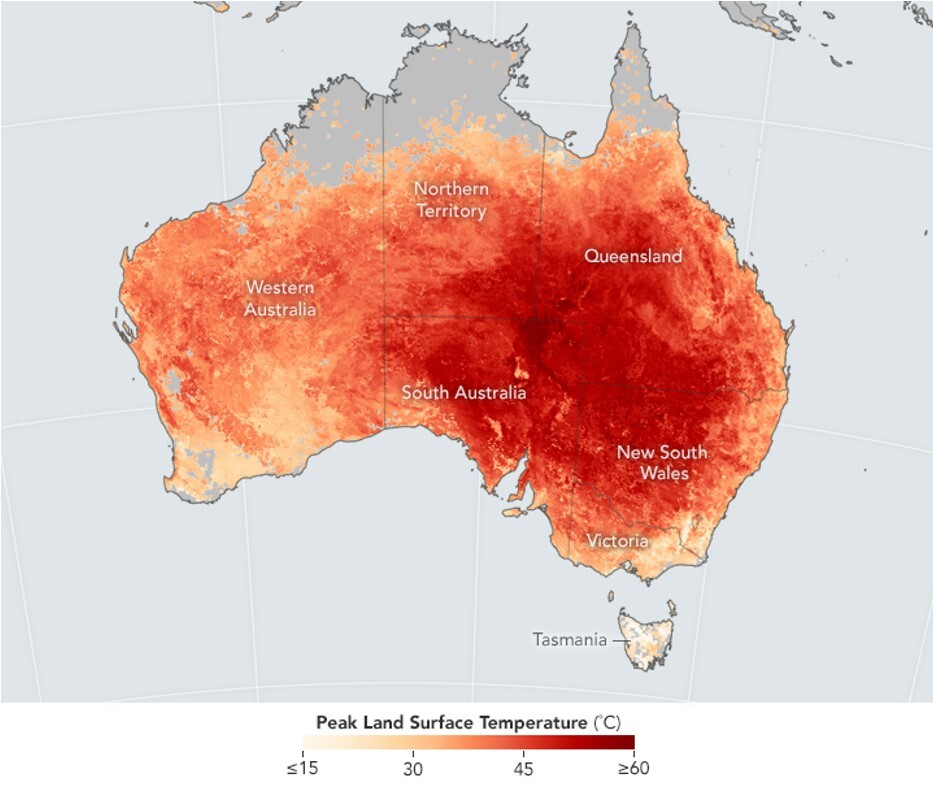

Written by Prof Karen Dwyer - Nephrologist, Clinical Director, Kidney Health Australia
The arrival of December in Australia heralds the start of summer and the potential of heat waves. Over the last decade or so the number, frequency, intensity, and duration of heat waves in Australia has increased.
· The Australian summer of 2012–2013, known as the Angry Summer or Extreme Summer, resulted in 123 weather records being broken over a 90-day period, including the hottest day ever recorded for Australia as a whole, the hottest January on record, the hottest summer average on record, and a record seven days in row when the whole continent averaged above 39°C. Single-day temperature records were broken in dozens of towns and cities. From 28 December 2012 through at least 9 January 2013 Australia faced its most severe heatwave in over 80 years, with a large portion of the nation recording high temperature readings of above 40 - 45°C.
· In February 2017, Australia experienced an extreme heat wave with temperatures as high as 47.6°C in New South Wales. The heatmap generated by NASA Earth Observatory – [https://earthobservatory.nasa.gov/IOTD/view.php?id=89683] shows peak land surface temperatures between February 7 and 14, 2017, a period when some of the most extreme heating occurred.

· From 25 December 2018, Australia was faced with constant record-breaking heatwaves. December 2018 was recorded as the hottest December on record, while New South Wales had their warmest January since 2011. Adelaide recorded its hottest day on record on 24 January of 46.6°C. On 25 January Melbourne had its hottest day of 43°C.
· Headlines from 6 December 2022 of “Temperatures forecast to reach mid-40s as heatwave hits northern Australia” provide a stark reminder of what may be in store over the ensuing months.
Australia is a nation of extreme weather events. Extreme heat— as commonly occurs over the summer months— has been linked with excess mortality (1). An increased hospital admission rate for kidney disease has been observed in men (35-64 years) working outdoors during heat waves in Adelaide (2). Similarly, kidney related morbidity was increased during South Australian heatwaves in 2008 and 2009 (3). An upsurge in kidney related presentations (4) and dehydration (5) was also documented during heat waves in New South Wales in 2011. Most recently, Borg et al (6) examined data from a 10-year period in Adelaide South Australia and demonstrated that the excess heat factor, a metric defining heat intensity (7) predicts morbidity from urinary disease, in particular acute kidney injury and kidney stones.
The data highlights the potential for morbidity and mortality in times of extreme heat stress. Those most vulnerable include older age groups (>65 years) (8) and those with underlying chronic medical conditions including cardiovascular diseases, diabetes, kidney diseases, nervous system disorders, emphysema and epilepsy (9). Further many prescription drugs can be risk factors for heat-related illness and subsequent kidney involvement, due to their ability to inhibit thermoregulation in various ways (e.g., altered sweat production, dehydration, increased heat production, impaired thirst recognition or inhibited heat loss). These include many psychotropic drugs including neuroleptics, anxiolytics, antidepressants and anti-cholinergics commonly used in the treatment of mental and cognitive disorders, as well as anti-hypertensives (including b-blockers) and diuretics. Environmental factors to consider include the availability or not of air conditioning and finances to support its use; house insulation; availability and use of blinds and awnings; social connections and contacts and confidence to call upon them (8).
The Australian Bureau of Meteorology defines a heat wave as "three days or more of maximum and minimum temperatures that are unusual for the location". For those at risk it may be useful to create a heat wave plan (4) to minimise risk and harm. Common strategies employed during the extreme heat waves in SA by older survey respondents included (8):
· Wearing cooler clothes
· Reducing physical activities
· Closing blinds and curtains
· Staying indoors
· Reducing outdoor activities
· Keeping regular appointments
· Opening up the house in the evening
· Drinking more fluid
Less common strategies included (8):
· Taking extra cool showers
· Using a wet cloth on neck and face
· Going to cooler places
· Taking regular welfare phone calls/visits during heat waves
In the context of extreme heat medications may need adjustment. For example, diuretics and antihypertensives potentially should be reduced or with-held depending on clinical state and heat. Health literacy and understanding the role of medications is a critical factor. Symptoms to be alert for and guide dose adjustment may include dizziness, thirst, headache, heat stress and loss of balance (8). Follow-up with a timely medical review is recommended.
This has been hotly debated and recently discussed in The Conversation: How Much Water Should I Drink? We Asked Five Experts (scitechdaily.com) Do you really need to drink 8 glasses of water a day? An exercise scientist explains why your kidneys say 'no' (theconversation.com)
Importantly, do not recommend to hydrate with soft drink. Soft drink contains lots of sugar, the fructose component of which results in local tubular injury, inflammation, and oxidative stress when metabolised by the kidney (reviewed in 10). In addition to the injury associated with fructose metabolism, fructose may be able to stimulate vasopressin/ADH that can then augment the renal injury. Indeed, a recent clinical study also reported that rehydration with soft drinks could induce markers of kidney damage in healthy subjects following exercise in high temperatures (11).
Prof Karen Dwyer, Clinical Director, Kidney Health Australia
1. Bi P, Williams S, Loughnan M, Lloyd G, Hansen A, Kjellstrom T, et al. The effects of extreme heat on human mortality and morbidity in Australia: implications for public health. Asia Pacific Journal of Public Health. 2011;23(2_suppl):27S-36S.
2. Hansen AL, Bi P, Ryan P, Nitschke M, Pisaniello D, Tucker G. The effect of heat waves on hospital admissions for renal disease in a temperate city of Australia. Int J Epidemiol. 2008;37(6):1359-65.
3. Nitschke M, Tucker GR, Hansen AL, Williams S, Zhang Y, Bi P. Impact of two recent extreme heat episodes on morbidity and mortality in Adelaide, South Australia: a case-series analysis. Environ Health. 2011;10:42.
4. Khalaj B, Lloyd G, Sheppeard V, Dear K. The health impacts of heat waves in five regions of New South Wales, Australia: a case-only analysis. Int Arch Occup Environ Health. 2010;83(7):833-42.
5. Schaffer A, Muscatello D, Broome R, Corbett S, Smith W. Emergency department visits, ambulance calls, and mortality associated with an exceptional heat wave in Sydney, Australia, 2011: a time-series analysis. Environ Health. 2012;11(1):3.
6. Borg M, Nitschke M, Williams S, McDonald S, Nairn J, Bi P. Using the excess heat factor to indicate heatwave-related urinary disease: a case study in Adelaide, South Australia. Int J Biometeorol. 2019.
7. Langlois N, Herbst J, Mason K, Nairn J, Byard RW. Using the Excess Heat Factor (EHF) to predict the risk of heat related deaths. J Forensic Leg Med. 2013;20(5):408-11.
8. Nitschke M, Hansen A, Bi P, Pisaniello D, Newbury J, Kitson A, et al. Risk factors, health effects and behaviour in older people during extreme heat: a survey in South Australia. Int J Environ Res Public Health. 2013;10(12):6721-33.
9. Semenza JC, McCullough JE, Flanders WD, McGeehin MA, Lumpkin JR. Excess hospital admissions during the July 1995 heat wave in Chicago. American journal of preventive medicine. 1999;16(4):269-77.
10. Dwyer KM, Robson B, Muecke J. Too much sugar does not just make us fat; it can also make us sick. Internal Medicine Journal. 2022.
11. Chapman CL, Johnson BD, Sackett JR, Parker MD, Schlader ZJ. Soft drink consumption during and following exercise in the heat elevates biomarkers of acute kidney injury. Am J Physiol Regul Integr Comp Physiol. 2019;316(3):R189-r98.